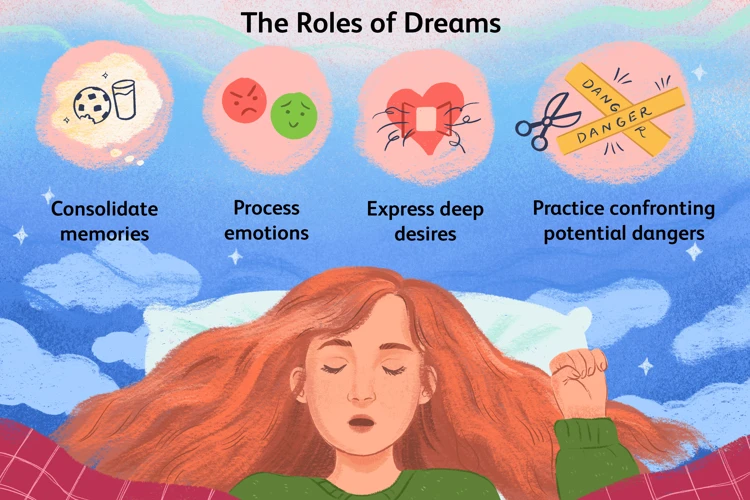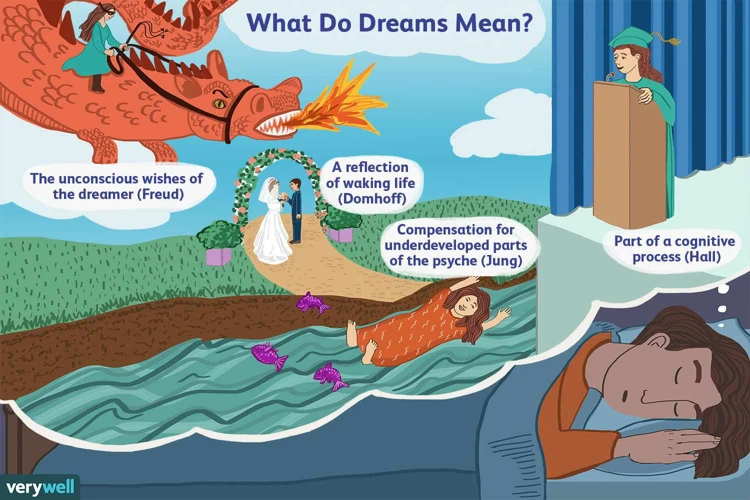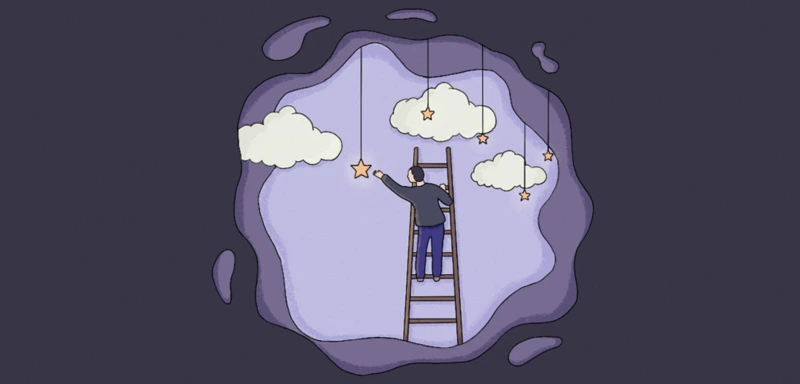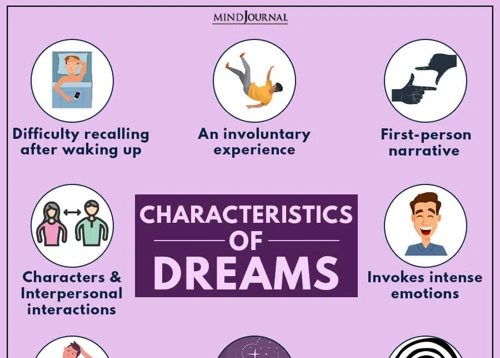The Fascinating Connection Between Dream Emotions and Waking Life Experiences

Have you ever woken up from a dream, heart pounding and emotions still racing, only to wonder what caused such intense feelings while you were asleep? Dreams have long been a subject of intrigue, their mysterious nature captivating both scientists and dream enthusiasts alike. But what is the meaning behind these intense dream emotions, and do they have any connection to our waking life experiences? In this article, we will delve into the fascinating relationship between dream emotions and our daily lives, exploring how our dreams can serve as a reflection of our emotions and experiences, and offering insights on how to interpret and utilize these emotions for personal growth and well-being. Get ready to embark on a journey through the realm of dreams and emotions, as we unravel the enigmatic connections between the two.
The Meaning Behind Dream Emotions

Dreams have long been regarded as windows into our subconscious, revealing hidden emotions and desires that we may not be aware of in our waking life. When it comes to dream emotions, they serve as a powerful tool for self-reflection and understanding. Each emotion experienced in a dream holds significance, providing valuable insights into our psyche. Whether it’s fear, love, anger, sadness, or joy, these emotions in dreams can offer a glimpse into our deepest thoughts and emotions. For example, experiencing fear in a dream could indicate underlying anxieties or insecurities that we may not acknowledge in our waking life. The intensity of dream emotions can often be heightened, allowing us to process and release suppressed emotions. Dream emotions can be metaphorical, representing a larger theme or message that our subconscious is trying to convey. By paying attention to these dream emotions and exploring their meanings, we can gain a deeper understanding of ourselves and the inner workings of our mind. If you’re interested in delving deeper into the healing potential of emotionally charged dreams, you might find this article insightful. Additionally, if you’re curious about the science behind dream emotions, you can check out this resource. Dream journaling is also a beneficial practice for emotional self-discovery, as it allows you to document and analyze your dreams. To learn more about the process of dream journaling, you can explore this guide.
Understanding Waking Life Experiences

Our waking life experiences shape who we are and greatly influence our emotional state. Every day, we encounter a myriad of events, interactions, and challenges that contribute to the complex tapestry of our emotions. Emotions act as a reflection of our experiences, serving as a barometer for how we perceive and navigate the world around us. They can be powerful indicators of our needs, desires, and concerns. Whether it’s receiving a promotion at work, having a disagreement with a loved one, or simply enjoying a beautiful sunset, these experiences elicit emotions that color our perception of reality. To truly understand the relationship between dream emotions and waking life experiences, it is important to acknowledge the impact that our daily events have on our emotional landscape. By recognizing and processing these experiences, we can gain valuable insights into our own emotions, desires, and motivations, consequently unveiling a deeper understanding of the emotional content of our dreams.
Emotions as a Reflection
Our emotions have a profound impact on our dreams, and they often serve as a reflection of our waking life experiences. Just as our dreams can influence our emotions, our emotions can influence our dreams as well. When we experience intense emotions during the day, such as stress, happiness, or sadness, they can seep into our dreams and manifest in various ways. For example, if you had a particularly stressful day at work, you may find yourself having anxiety-ridden dreams that night. Similarly, if you experienced a joyful event, your dreams might be filled with feelings of happiness and excitement. Our dreams act as a canvas upon which our emotions are projected, providing us with a safe space to process and explore these intense feelings. They allow us to delve deeper into our subconscious and gain a better understanding of our emotional state. By paying attention to the emotions we experience in our dreams, we can gain valuable insights into our current emotional well-being and the effect that our daily experiences have on us. Understanding the connection between our emotions and dream content can offer a unique perspective on our inner world and can even help us find resolution or clarity for unresolved emotional experiences.
Impact of Daily Events
The emotions we experience in our dreams are not isolated from our waking life experiences. In fact, they are often deeply intertwined. Our daily events and interactions can significantly impact the emotions we feel in our dreams. Whether we’re aware of it or not, our subconscious mind processes and assimilates the events of our day, influencing the content and emotional tone of our dreams. For example, if we have a particularly stressful or anxiety-inducing day, it’s not uncommon to have dreams filled with fear or unease. Similarly, positive and joyful experiences can manifest as happiness and contentment in our dreams. To further illustrate the connection between daily experiences and dream emotions, let’s consider a scenario: imagine you have an argument with a loved one during the day. Later that night, you may have a dream where you experience anger or frustration, as your unconscious mind processes and reacts to the emotional impact of the argument. The emotional residue from daily events can seep into our dreams, shaping the vivid emotions we encounter. By recognizing and reflecting on these connections, we can gain insights into how our daily lives affect our dream experiences and emotions. It’s worth noting that not all dream emotions are direct reflections of specific events, as dreams can also tap into more abstract and symbolic representations of our emotions.
Interpreting Dream Emotions in Context

Dreams are complex and often symbolic, requiring careful interpretation to fully grasp their meaning. When it comes to interpreting dream emotions, it is important to consider them in the context of the overall dream narrative and our waking life experiences. One way to understand dream emotions is to explore the symbolic associations they may hold. For example, feeling fear in a dream could represent unresolved anxieties or concerns in our waking life. Additionally, dream emotions can offer psychological insights into our subconscious thoughts and feelings. They may reflect aspects of our personality, desires, or fears that we may not be consciously aware of. It is also crucial to reflect on our personal experiences and circumstances when interpreting dream emotions. By analyzing the events and situations that led to the dream, we can gain a better understanding of the emotions being experienced. Ultimately, interpreting dream emotions in context requires a multidimensional approach, considering both the symbolic and personal significance they may hold.
Symbolic Associations
Symbolic associations play a vital role in interpreting dream emotions. Dreams often communicate through symbols and imagery, using these representations to convey deeper meanings and messages. When it comes to dream emotions, they can be intertwined with specific symbols that hold personal significance or cultural symbolism. For example, dreaming of a snake might evoke feelings of fear or anxiety due to the symbol’s association with danger or deceit. However, it’s essential to remember that the interpretation of symbols in dreams can be highly individualistic, as personal experiences and cultural backgrounds can influence their meaning. To understand the symbolic associations attached to dream emotions, it can be helpful to reflect on your personal experiences, beliefs, and the context of the dream itself. Keeping a dream journal can aid in recognizing recurring symbols and themes, allowing you to decipher their connection to your emotional state. By exploring the symbolic associations within your dreams, you can gain a deeper understanding of the underlying emotions and experiences that may be influencing your waking life.
Psychological Interpretations
Psychological interpretations play a crucial role in understanding the meaning behind dream emotions. Dreams are deeply influenced by our subconscious mind, and psychologists believe that analyzing these emotions can provide valuable insights into our psychological well-being. One common approach is to explore the symbolism and imagery present in our dreams. For example, if you dream of being chased, it could symbolize a sense of running away from a problem or feeling overwhelmed in your waking life. Similarly, dreaming of falling could represent a fear of failure or a lack of control. It’s important to note that dream symbols and their interpretations can vary from person to person, as they are deeply rooted in personal experiences and emotions. Another psychological interpretation is to consider the emotional themes or patterns that consistently arise in your dreams. Are you frequently experiencing fear or anxiety? Is there a recurring theme of being lost or abandoned? These emotional patterns can be indicative of underlying psychological issues that may need attention and resolution. Engaging in dream analysis with a trained therapist or psychologist can be incredibly helpful in unraveling the complex layers of dream emotions and their psychological implications. By exploring the psychological interpretations of your dream emotions, you can gain a deeper understanding of yourself and address any unresolved issues that may be affecting your waking life.
Personal Experiences
One of the key aspects in interpreting dream emotions is understanding their relationship to our personal experiences. Dreams often draw upon our memories, thoughts, and emotions from our waking life, creating a unique tapestry of symbolism and meaning. Our personal experiences shape the context in which our dream emotions arise. For example, if you have recently experienced a significant loss, such as the death of a loved one, it is not uncommon to have dreams of sadness or grief. These dreams can be a way for our subconscious to process and cope with the emotions associated with our loss. Similarly, positive experiences in our waking life, such as falling in love or achieving a personal goal, can manifest as dreams filled with joy and happiness. By reflecting on our personal experiences and identifying any connections to our dream emotions, we can gain deeper insights into our own emotional landscape. This self-reflection allows us to better understand the impact of our experiences on our emotional well-being and overall mental health. Through this process, we can cultivate greater self-awareness and make positive changes in our lives.
Exploring Common Dream Emotions

Dreams have the incredible ability to evoke a wide range of emotions, some of which may be familiar and relatable to many people. Let’s explore some of the most common dream emotions and their possible meanings. Fear and anxiety often make appearances in dreams, reflecting our deep-seated worries and concerns. Love and desire can manifest as intense emotions, symbolizing our yearning for connection and intimacy. Anger and frustration may arise in dreams, representing unresolved conflicts or pent-up emotions. Sadness and grief may be experienced, reflecting our unconscious processing of loss or emotional pain. On the other hand, dreams can also bring immense joy and happiness, allowing us to experience positive and uplifting emotions. It is important to note that the interpretation of dream emotions is highly subjective and can vary from person to person. While these common dream emotions provide a starting point, the context and personal experiences surrounding the dream are essential for a more accurate understanding of the emotions involved.
Fear and Anxiety
Fear and anxiety are common emotions that often manifest in our dreams. These intense emotions can stem from a variety of sources, such as unresolved conflicts, past traumas, or the anticipation of future challenges. Dreams that evoke fear and anxiety may involve scenarios like being chased, falling, or facing a threatening situation. The experience of fear and anxiety in dreams can serve as a reflection of our fears and worries in waking life, acting as a mechanism for processing and working through these emotions. It is important to note that dream fear and anxiety are not always literal representations of our real-life fears. They can also symbolize deeper psychological or emotional states, such as a fear of failure or a sense of vulnerability. Understanding the context and symbolism of these dream emotions is crucial in interpreting their meaning. Keeping a dream journal can be beneficial in identifying patterns and triggers of fear and anxiety in your dreams. By recognizing recurring themes or situations that evoke fear, you can gain insight into the underlying causes and work towards addressing them. It’s essential to approach fear and anxiety in dreams with curiosity and open-mindedness, allowing yourself to explore the emotions and their connections to your waking life experiences.
Love and Desire
Love and desire are common emotions that frequently manifest in dreams. Dream scenarios involving love and desire often elicit intense emotions and vivid imagery. These dreams can range from romantic encounters to passionate pursuits, reflecting our deepest longings and desires. It’s important to remember that dream representations of love and desire are not always literal interpretations of our waking life relationships or attractions. Instead, they can symbolize our longing for emotional connection, intimacy, or fulfillment in various aspects of life. Dreaming about love and desire can serve as a reminder to explore and nurture our own needs and desires, whether it be in personal relationships, career aspirations, or creative pursuits. These dreams can also bring awareness to any unresolved emotions or unfulfilled desires we may have. It’s important to pay attention to the emotions and details of these dreams, as they can offer valuable insights into our deepest emotional needs and passions. By analyzing the symbolism and context of love and desire in our dreams, we can gain a better understanding of our own desires and work towards manifesting them in our waking life. Love and desire in dreams are powerful forces that can motivate us to seek more fulfillment and connection in all areas of our lives.
Anger and Frustration
Anger and frustration are common emotions that can often manifest in dreams, providing valuable insights into our inner turmoil and unresolved conflicts. When we feel angry or frustrated in a dream, it is essential to pay attention to the specific circumstances and individuals involved. These dream scenarios can be symbolic representations of situations or relationships that are causing us distress in our waking life. For example, if you find yourself arguing with a loved one or facing obstacles in a dream, it may signify underlying tensions and unresolved issues in your personal relationships. It’s crucial to explore the root causes of these emotions to address any deep-seated anger or frustration that may be holding you back. Dreams of anger and frustration can also serve as catalysts for personal growth and change. By acknowledging and examining these emotions, you can work towards finding constructive ways to express yourself and resolve conflicts in your waking life. Remember, dream emotions are not to be dismissed or ignored; they serve as powerful tools for self-reflection and personal development.
Sadness and Grief
Sadness and grief are common emotions experienced in both dreams and waking life. When we dream of sadness or grief, it often reflects unresolved emotional pain or loss that we may have experienced in the past or are currently going through. Dreams can provide a safe space for us to process and confront these complex emotions. If you find yourself dreaming of sadness or grief, it may be an indication that there are unresolved feelings or unfinished business that you need to address in your waking life. It’s important to acknowledge and validate these emotions, allowing yourself to mourn and heal. Dreaming of sadness or grief can also serve as a reminder of the importance of self-care and seeking support from loved ones or professionals. If you’re struggling with overwhelming feelings of sadness or grief, it may be helpful to reach out to a therapist or counselor who can provide guidance and support during this challenging time. Remember, dreams are a powerful tool for self-reflection, understanding, and ultimately, healing.
Joy and Happiness
Joy and happiness are powerful and uplifting emotions that have the ability to bring a profound sense of well-being and fulfillment. In dreams, experiencing joy and happiness can signify a deep sense of contentment, satisfaction, and inner peace. These positive emotions in dreams often reflect our subconscious desires for happiness and fulfillment in our waking life. Dreaming of joy and happiness can symbolize a sense of accomplishment, success, or the fulfillment of a long-awaited goal or aspiration. It can also represent the presence of love, harmonious relationships, or a general state of emotional well-being. When we experience joy and happiness in our dreams, it can serve as a reminder to cultivate these positive emotions in our everyday lives. It encourages us to cherish the moments of joy and seek out activities, relationships, and experiences that bring us happiness. Embracing joy and happiness in our waking lives can contribute to overall well-being and contribute to a positive mindset. Whether it’s pursuing our passions, spending time with loved ones, or practicing gratitude, nurturing joy and happiness is essential for a fulfilling and meaningful life.
Translating Dream Emotions into Daily Life
Translating dream emotions into daily life can be a transformative journey of self-discovery and personal growth. One key step is identifying emotional patterns that recur both in dreams and in waking life. By recognizing these patterns, we can gain valuable insights into our own emotional landscape and make informed decisions to enhance our overall well-being. It’s essential to pay attention to the emotions that arise during both positive and negative experiences in our dreams, as they often reflect deeper desires or unresolved issues within ourselves. Making positive changes in our waking life based on these dream emotions can lead to a more fulfilling and authentic existence. This may involve taking steps to address fears or anxieties, nurturing relationships, or pursuing passions that bring us joy and happiness. If needed, seeking professional guidance can also be beneficial in understanding and integrating dream emotions into our daily lives. Remember, dreams are not just ephemeral experiences – they offer valuable insights that can guide us towards a more meaningful and fulfilling existence.
Identifying Emotional Patterns
Emotions are complex and multifaceted, and they often manifest in patterns throughout our dreams and waking life. Identifying these emotional patterns can provide invaluable insights into our inner world and help us understand recurring themes or issues that we may be facing. To begin identifying emotional patterns, it’s helpful to keep a dream journal and reflect on your dreams regularly. Look for common emotions that arise across different dreams and take note of any similarities or differences. Ask yourself questions such as: Do I frequently experience fear or anxiety in my dreams? Do I notice a recurring feeling of love or desire? Am I often confronted with anger or frustration in my dream scenarios? By recognizing these patterns, you can gain a deeper understanding of the underlying emotions that may be influencing your thoughts and behaviors. It’s important to approach this process with an open mind and without judgment, allowing yourself to explore and examine your emotions honestly. Once you have identified specific emotional patterns, you can begin to explore their possible connections to your waking life experiences. For example, if you often experience fear or anxiety in your dreams, it could be an indicator of underlying stress or unresolved issues in your daily life. Recognizing these patterns allows you to address and work through these emotions, leading to personal growth and enhanced emotional well-being. By paying attention to emotional patterns in both your dreams and waking life, you can gain valuable insights into yourself and make positive changes for a more fulfilling existence.
Making Positive Changes
Making positive changes in our lives is a goal that many of us strive for, and our dreams can serve as a catalyst for personal growth and transformation. When it comes to dream emotions, they can provide valuable insights into areas of our lives that may require attention and improvement. By paying attention to the emotions experienced in our dreams, we can identify patterns and recurring themes that point towards areas of our waking life that may be causing us distress or holding us back. For example, if we frequently experience feelings of frustration or anger in our dreams, it might be an indication that there are unresolved conflicts or unresolved issues in our daily life that need to be addressed. By acknowledging these emotions and reflecting on their connection to our waking life, we can take proactive steps towards making positive changes. This could involve seeking therapy or counseling to work through emotional baggage, practicing mindfulness and stress-reduction techniques, or making lifestyle changes that promote well-being. It’s important to remember that the process of making positive changes takes time and effort, and it’s okay to seek support and guidance along the way. Whether it’s through self-reflection, seeking professional help, or engaging in practices such as journaling or meditation, our dreams can offer valuable insights and serve as a catalyst for positive change in our lives.
Seeking Professional Guidance
Seeking professional guidance can be an invaluable step when it comes to understanding and interpreting the emotions experienced in our dreams and their connection to our waking life experiences. Sometimes, dream emotions can be complex and deeply rooted, requiring the expertise of a therapist or dream analyst. These professionals have in-depth knowledge and experience in the field of dream analysis, allowing them to provide a deeper level of insight and interpretation. They can help you explore the underlying meanings of specific dream emotions, unravel recurring themes, and uncover patterns that may be influencing your waking life experiences. By working with a professional, you gain access to a safe and supportive environment where you can openly discuss your dreams and emotions without fear of judgment. They can offer guidance on how to integrate the insights gained from dream exploration into your daily life, providing strategies for personal growth and emotional well-being. If you find that your dream emotions are significantly impacting your mental health or overall sense of well-being, seeking professional guidance is highly recommended. Remember, it’s important to choose a qualified and reputable professional who specializes in dream analysis or therapy to ensure you receive the best support and guidance.
Conclusion
In conclusion, the relationship between dream emotions and waking life experiences is a complex and fascinating phenomenon. Dreams serve as a portal to our subconscious, offering insights into our deepest thoughts, feelings, and desires. By exploring and interpreting dream emotions, we can gain a better understanding of ourselves and our emotional landscapes. Dream emotions, whether they are fear, love, anger, sadness, or joy, hold symbolic and psychological meanings that can provide valuable guidance and self-reflection. It is crucial to pay attention to these emotions in order to identify patterns, make positive changes, and seek professional guidance if necessary. Remember, dreams are not just random fragments of our imagination but hold significant messages that can help us navigate through our waking lives. So, the next time you wake up from a vivid dream, take a moment to reflect on the emotions it evoked and the potential lessons it may hold for your personal growth and well-being.
Frequently Asked Questions
What causes intense emotions in dreams?
The exact cause of intense emotions in dreams is still not fully understood. However, it is believed that these emotions can arise from a combination of factors, including unconscious thoughts and feelings, personal experiences, and the activation of certain brain regions during REM sleep.
Can dream emotions affect our mood upon waking up?
Yes, dream emotions can have a profound impact on our mood upon waking up. Whether we experience positive or negative emotions in our dreams, they can linger and influence our mood throughout the day, shaping our perception and interactions with others.
How can dream emotions provide insight into our subconscious?
Dream emotions can serve as a powerful gateway to our subconscious mind. They can reveal underlying fears, desires, and unresolved conflicts that we may not be fully aware of in our waking life. Analyzing these emotions can offer valuable insights into our true thoughts and emotions.
Are dream emotions always symbolic?
While dream emotions can often be symbolic, they are not always the case. Sometimes, dream emotions may directly mirror our waking life experiences and reflect our current emotional state or the events happening in our lives.
Can recurring dream emotions have a specific meaning?
Yes, recurring dream emotions can indicate a pattern or theme that requires our attention. It may signify unresolved issues or recurring emotions that we need to address in our waking life. Paying close attention to these recurring emotions can provide valuable guidance for personal growth.
Can dream emotions be influenced by external factors?
Absolutely! Dream emotions can be influenced by various external factors, including daily experiences, stress levels, relationships, and environmental stimuli. Our subconscious mind often weaves these factors into our dreams, resulting in corresponding emotions.
Is it possible to control or manipulate dream emotions?
While it’s challenging to have complete control over dream emotions, some individuals practice lucid dreaming, where they become aware that they are dreaming. In lucid dreams, it may be possible to influence or manipulate certain emotions by actively engaging with the dream scenario.
What can we do to remember and analyze dream emotions?
Keeping a dream journal can greatly aid in remembering and analyzing dream emotions. By writing down your dreams as soon as you wake up, you can capture the emotions you experienced and explore their meanings in greater detail.
Are there any negative effects of suppressing dream emotions?
Suppressing or ignoring dream emotions can have negative effects on our well-being. It may lead to unresolved emotional issues, increased stress levels, and difficulty in understanding ourselves on a deeper level. It is important to acknowledge and explore dream emotions for personal growth and emotional health.
Can dream emotions impact our decision-making in waking life?
Yes, dream emotions can have an impact on our decision-making in waking life. They can provide valuable insights into our true desires and fears, influencing the choices we make and helping us align our actions with our deeper emotions and values.








